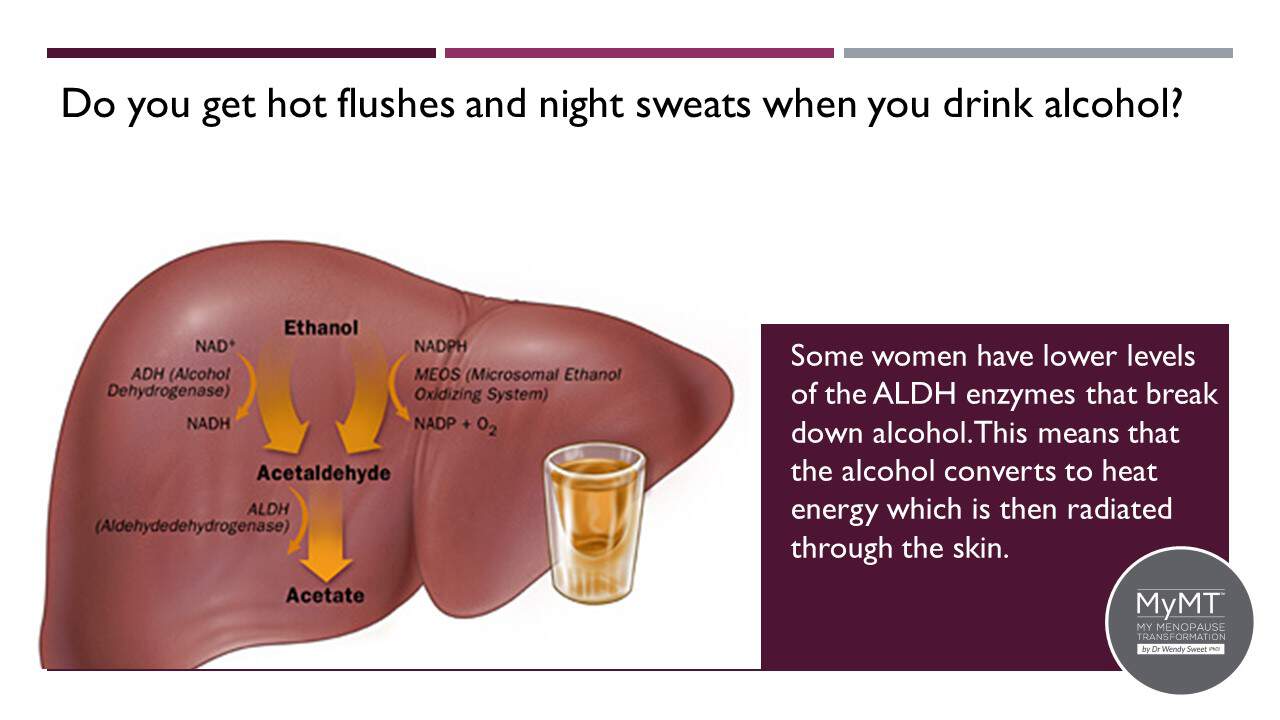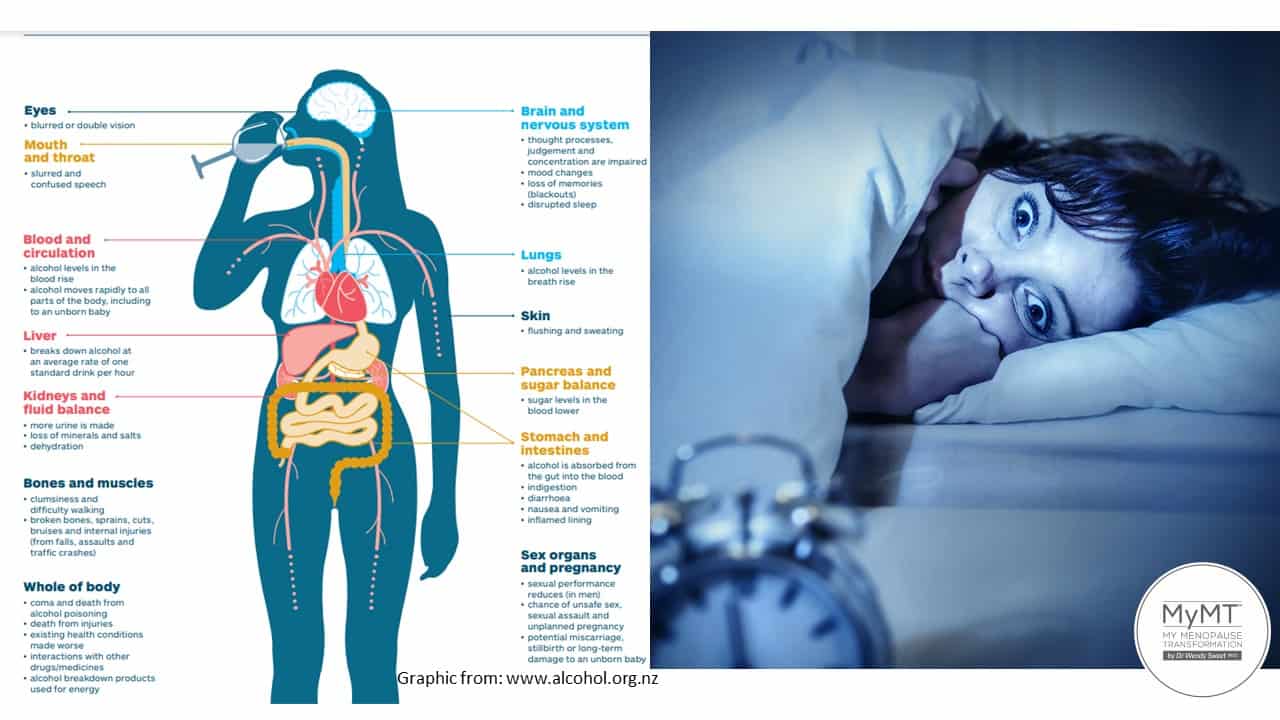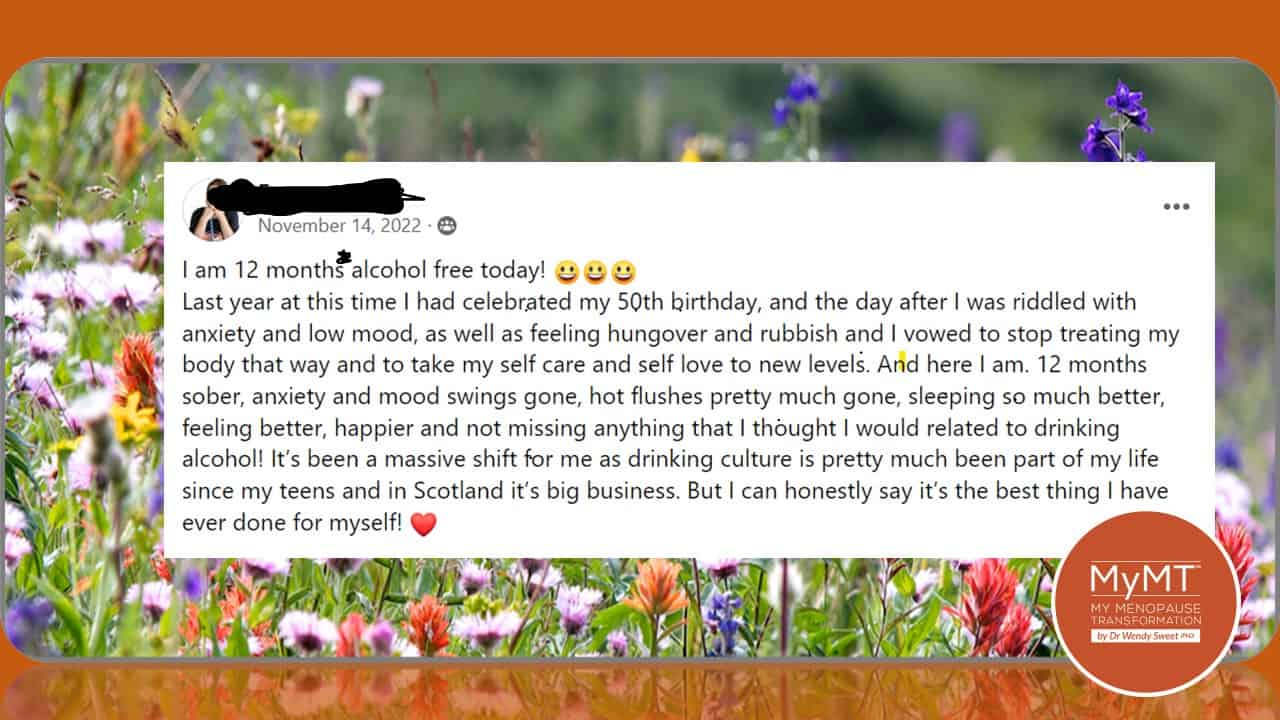Drinking culture is big business in many parts of the world and I was reminded of it today as I stood in line at check-in at Geneva airport.
The woman was in her 50s and was off to Dubai to party-up a storm with her friend. In their race to get to check-in, they had already downed a couple of martinis. Whilst it sounded like they were going to have lots of fun, I couldn’t help noticing that she was already fanning her face with a notebook she was holding.
There’s nothing wrong with a having alcohol of course and most of us enjoy it socially, however, I know myself that it’s challenging when we are distracted with hot flushes when we drink … especially as we reach our post-menopause years – this designates when you haven’t had your period for a year or more.
When it comes to alcohol and our symptoms, I’m not surprised that numerous women on the MyMT programmes mention similar experiences.
It’s hard to know exactly when I made the connection between alcohol and my own hot flushes and poor sleep. If you’ve been enjoying that glass of beautiful wine for years without feeling the effects of hot flushes, when it does happen, you know that ‘something’ is going on.
But on reflection, it was when I moved from peri-menopause into post-menopause, that I really noticed it. So I wasn’t surprised when I saw that research supports what many of us have noticed – alcohol and menopause, don’t mix!*

Peri-menopause typically begins around your mid-40’s. It’s the time of life when your reproductive hormones are starting to go into natural decline.
Whilst peri-menopause is when symptoms are usually at their worst, as we move into menopause (when periods have stopped) and then to post-menopause (when our periods have stopped for a year or more), some of the symptoms can hang around – for women who drink alcohol this can include hot flushes.
The good news for those of you in peri-menopause is that the effect of your biological ageing hasn’t quite hit your liver or blood vessels yet. You still have some way to go before structural changes begin in your liver.
For women in post-menopause, it’s these structural changes that help to explain why that glass of wine starts to make you feel hot and sweaty when it hasn’t had this effect on you before.
Alcohol is associated with a higher risk of hot flushes when women are in post-menopause. It’s all to do with our post-menopause hormone, testosterone. Yes, even though we are females, our body still produces some testosterone, especially if women still have their ovaries as they move into post-menopause.
Add to this, our stressful lives at the moment, not sleeping properly and our ageing muscles and liver; alcohol consumption clashes with these other factors too. This combination causes many women to produce more testosterone, the hot flushes get worse, post-menopause weight increases and our gut health is affected too.
Numerous studies have shown that alcohol has an effect on other hormones too. This includes testosterone and the hormones that control our blood sugar levels – insulin and glucagon. This is especially so for women having more than 2-4 drinks a week – or having this many drinks all at once.
When women in post-menopause drink more than 2-3 glasses of alcohol at once, DHEA-S (the sulphated form) increases in the bloodstream. When levels of DHEA-S are higher than normal, this causes more hot flushes.
The effect, to researchers, is higher in post-menopausal women than peri-menopausal women. That’s why, if you are younger and only in peri-menopause, alcohol may not affect your ‘hot-flush’ triggers, however, it may be starting to affect your sleeping patterns instead.

Alcohol loves your liver. It supplies a ready and steady source of glucose (sugar) and glycogen (stored glucose) reserves.
At the same time however, while your liver is trying to take up the glucose from the alcohol, it is also trying to clear the toxins and preservatives in alcohol in order to protect your brain. The alcohol is therefore, preventing the liver from absorbing glucose and storing it, which is what the liver wants to do. Hence, many women have cravings for more and more alcohol as the need for glucose in the liver is so great.
When I came to better understand that with menopause being the biological gateway to our ageing, I also researched all the changes that are going on inside our cells and tissues as we lose oestrogen.
Knowing what to do to change your lifestyle to adjust to these natural changes is important, it’s what I teach women in the 12 week MyMT™ programmes.
With alcohol on my mind this week as well as the knowledge that it’s easy to open a bottle of wine at the end of a long, stressful day at work, I want to invite you to listen to the video below. In this, I explain how April is MyMT™ MENOPAUSE AT WORK Month, so all of my programmes are on sale with savings of NZ$75.
When I came to better understand that menopause is the biological gateway to our ageing, I also researched all the changes that are going on inside our cells and tissues as we lose oestrogen.
Knowing what to do to change your lifestyle to adjust to these natural changes is important, it’s what I teach women in the 12 week MyMT™ programmes. I would love you to discover these strategies as well.
Wherever you are in the world right now, I hope you are going well.
Dr Wendy Sweet, [PhD]/ Member: Australasian Society of Lifestyle Medicine/ MyMT™ Founder
Wendy Sweet, [PhD/ Member: Australasian Society of Lifestyle Medicine/ MyMT Health Coach]
References:
* Schilling, C. et. al (2008). Current Alcohol Use, Hormone Levels, and Hot Flashes in Midlife Women. Fertil Steril., 87(6): 1483–1486. National Institute of Health.


